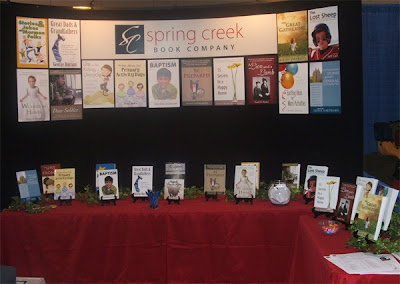I've never before received an e-mail that had
someone else's entire blog post copied and pasted, followed by the words, "What do you think?"
So go read
the post and all the comments over on
Six LDS Writers and A Frog, then come back here for my opinion.
***
As a reader and book buyer, I have never purchased multiple copies of a book just to get a variety of covers. I have, however, purchased new copies of books when a cooler cover came out. For example, I had the whole set of The Chronicles of Narnia, purchased about 20 years ago. When the movie came out, the market was flooded with reprints, all with new covers. I bought the trade copy with all seven books in one and the picture of the Snow Queen on the front. Did I "need" new copies? No. But the cover was really cool.
Also, as a reader and book buyer, I have browsed books on the shelf, picked them up, then put them back--only to see the same book on a different shelf with a different cover, picked it up for a second look, and bought it. Because the cover was more appealing and enticing to me. You'd think, being in the business and all, I would know better than to select or reject a book based on its cover. But I don't. I'm just like everyone else--easily seduced by a pretty picture.
As a publisher, there are reasons that justify multiple covers--all of them to do with marketing. Multiple covers are especially good for books that are genre or age cross-overs, like the Harry Potter books. Because they appeal to both children and adults, having a separate cover to target each age group is a good idea. How many adults want to be caught engrossed in a book with little kids on the cover? Okay, bad example. As proved in the U.S., where we only have one cover and no one cares. But you get the idea.
It's also a good idea with classics and blockbusters, like aforementioned Chronicles of Narnia. You know you're going to sell a lot of them, so the cost of multiple covers isn't a big deal. You do a cover that appeals to different types of people to seduce (there's that word again) them into purchasing a copy. You want to make the book as irresistible as possible to as many people as possible.
Another time for new covers is when a book has been out for awhile and you're doing a reprint--especially if there is any significant revision of the book (common in nonfiction, not in fiction). Cover art, fonts, and layout go in and out of style. If a book has been around for ten years or longer, you might want to do a new cover to update it and give sales a new shot. We've done that with books before. And yes, people will buy a replacement book with the new cover.
We always test market our book covers. Recently we did a book cover in pink, yellow and blue. No one liked the yellow, but the blue only had a small margin over the pink. If we'd expected to sell 50,000 copies, we might have considered doing a cover in both colors, but since we only expected to sell 5,000, we went with the blue. It wasn't the cost of the multiple covers (which isn't that big a deal), it's just that having multiple covers in a small market seems a little silly.
Now for the anti-multiple covers argument. In a small market, like the LDS market, your book cover is part of your branding of the book. Brands are important. They provide instant identification, which you want. If an author has multiple books, particularly if they are in a series, you want to extend that brand as much as you can. A good national example is Danielle Steele. You don't have to read a thing on her books to recognize the cover as one of hers. Good LDS examples are Heather Moore's Out of Jerusalem series and the Work and the Glory series (both sets of covers). The cover designs are part of the branding of the series. A bad example of this is Robison Wells'
Wake Me When It's Over and
The Counterfeit. (Sorry, Rob. What was with the cover of that first one, anyway?) You can't tell by a quick glance that these two books have anything to do with each other; or even that they're by the same author. In my opinion, that was a mistake--or at the very least, it didn't optimize the added sales potential of branding.
You want your books to stand out, to be unique, yet very recognizable to your rabid fans. You also don't want to have readers re-purchase the same book by accident. (How many of you think OSC's
Woman of Destiny and
Saints are two different books?) So in our market, the only time I'd do multiple covers is if the book has been around awhile and needs updating for some reason (like the Work & the Glory). Or possibly, if I did both a hardback
and a paperback release--but even then, I'd keep the covers similar enough that you could tell it was the same book.
So who wants to argue with me?

















